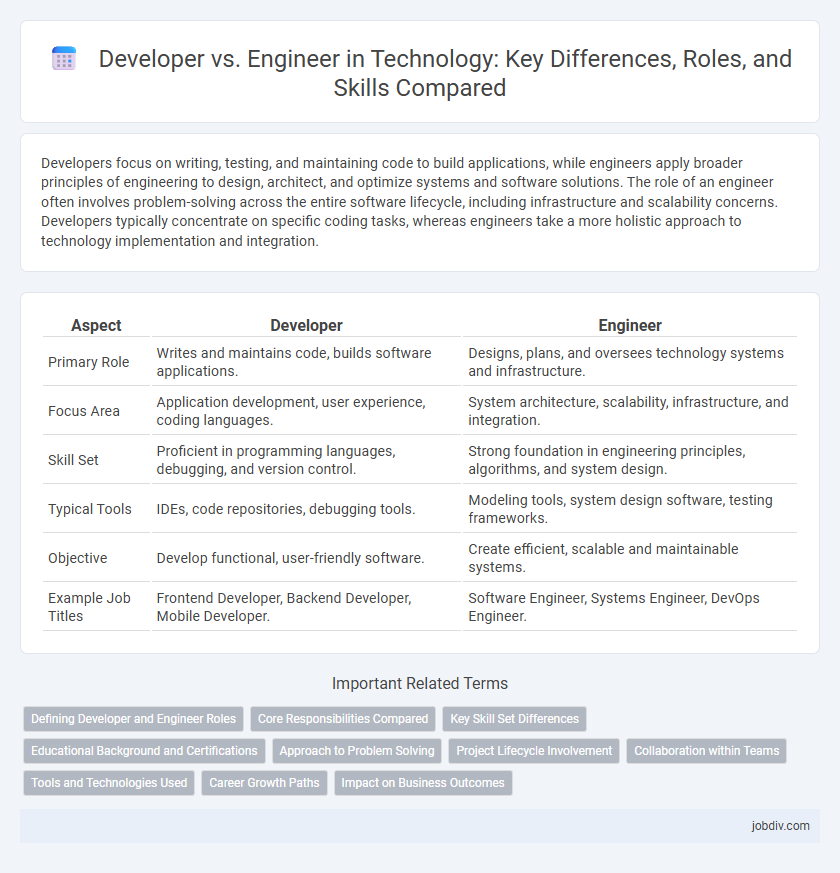Developers focus on writing, testing, and maintaining code to build applications, while engineers apply broader principles of engineering to design, architect, and optimize systems and software solutions. The role of an engineer often involves problem-solving across the entire software lifecycle, including infrastructure and scalability concerns. Developers typically concentrate on specific coding tasks, whereas engineers take a more holistic approach to technology implementation and integration.
Table of Comparison
| Aspect | Developer | Engineer |
|---|---|---|
| Primary Role | Writes and maintains code, builds software applications. | Designs, plans, and oversees technology systems and infrastructure. |
| Focus Area | Application development, user experience, coding languages. | System architecture, scalability, infrastructure, and integration. |
| Skill Set | Proficient in programming languages, debugging, and version control. | Strong foundation in engineering principles, algorithms, and system design. |
| Typical Tools | IDEs, code repositories, debugging tools. | Modeling tools, system design software, testing frameworks. |
| Objective | Develop functional, user-friendly software. | Create efficient, scalable and maintainable systems. |
| Example Job Titles | Frontend Developer, Backend Developer, Mobile Developer. | Software Engineer, Systems Engineer, DevOps Engineer. |
Defining Developer and Engineer Roles
Developers focus on writing, testing, and maintaining code to create software applications, emphasizing front-end and back-end programming tasks. Engineers apply engineering principles to design, build, and optimize complex systems, ensuring scalability, reliability, and performance across the software development lifecycle. The roles often overlap but differ in scope, with developers concentrating on implementation and engineers on architecture and system integration.
Core Responsibilities Compared
Developers primarily focus on writing, testing, and maintaining code to build software applications, ensuring functionality and user experience. Engineers concentrate on designing system architecture, integrating complex solutions, and optimizing performance within scalable environments. Both roles require strong problem-solving skills, but engineers often engage in higher-level planning and infrastructure management.
Key Skill Set Differences
Developers excel in programming languages like JavaScript, Python, and Ruby, emphasizing software creation, debugging, and user interface design. Engineers possess a broader skill set including system architecture, algorithm optimization, and integrating hardware with software, ensuring scalability and performance. Understanding these distinctions aids in aligning project needs with the right expertise in technology teams.
Educational Background and Certifications
Developers often possess degrees in computer science or related fields and may hold certifications like Certified Java Programmer or Microsoft Certified: Azure Developer Associate, emphasizing coding and application development skills. Engineers typically have broader educational backgrounds that include software engineering, systems engineering, or computer engineering degrees, supplemented by certifications such as Certified Software Development Professional (CSDP) or AWS Certified Solutions Architect, highlighting system design and architecture expertise. Both roles require continuous learning, but engineers usually pursue advanced certifications that validate capabilities in scalable system integration and infrastructure management.
Approach to Problem Solving
Developers approach problem solving by focusing on writing, testing, and maintaining code to implement specific features or applications. Engineers take a broader perspective, applying systematic methods and principles to design, build, and optimize entire systems ensuring scalability, reliability, and efficiency. This distinction emphasizes developers' emphasis on direct coding tasks, while engineers integrate cross-functional knowledge for comprehensive solutions.
Project Lifecycle Involvement
Developers typically concentrate on coding and implementing specific features during the development phase, ensuring functionality aligns with project requirements. Engineers engage in a broader scope throughout the entire project lifecycle, including system design, architecture planning, testing, and maintenance. Their involvement spans initial requirements gathering to deployment and ongoing optimization, ensuring long-term project viability.
Collaboration within Teams
Developers and engineers collaborate effectively by combining coding expertise with systematic problem-solving skills to drive project success. Developers focus on creating functional software components, while engineers design scalable architectures and optimize system performance. This synergy enhances team productivity, fosters innovation, and ensures the delivery of high-quality technological solutions.
Tools and Technologies Used
Developers typically use integrated development environments (IDEs) such as Visual Studio Code, IntelliJ IDEA, and Eclipse to write, test, and debug code, focusing primarily on programming languages like JavaScript, Python, and Java. Engineers often work with broader toolsets that include version control systems like Git, containerization tools like Docker, and continuous integration/continuous deployment (CI/CD) platforms such as Jenkins or GitLab CI to manage complex system architecture and deployment pipelines. Both roles leverage cloud platforms like AWS, Azure, or Google Cloud, but engineers emphasize infrastructure as code and automation for scalable application deployment.
Career Growth Paths
Developer career paths typically emphasize coding expertise, software design, and project implementation, progressing towards roles like senior developer, technical lead, or software architect. Engineer career trajectories often incorporate broader responsibilities such as system infrastructure, integration, and optimization, leading to positions like systems engineer, engineering manager, or solutions architect. Both paths require continuous skill enhancement and adaptability to evolving technologies to achieve leadership and specialization within tech organizations.
Impact on Business Outcomes
Developers and engineers play distinct roles in driving business outcomes, with developers primarily focused on creating software solutions that meet user needs and enhance customer experience. Engineers contribute by designing scalable and robust systems, ensuring long-term reliability and performance that support business growth. Collaboration between developers and engineers accelerates innovation, reduces time-to-market, and boosts overall organizational efficiency.
Developer vs Engineer Infographic

 jobdiv.com
jobdiv.com